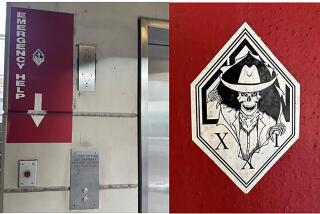L.A. County’s top lawyer filed state bar complaint against her predecessor
Los Angeles County Counsel Mary Wickham has filed a complaint with the State Bar of California against her predecessor, Mark J. Saladino, alleging that he improperly disclosed confidential information in his wrongful termination suit against the county, according to a letter from the state bar.
Wickham’s complaint also alleged that Saladino’s disclosure “caused conflict among” the Board of Supervisors, said the notice that was sent to Saladino and shared with The Times. The document didn’t go into detail about the conflicts or specify what triggered them.
The state bar investigates complaints against attorneys and takes disciplinary action. But it doesn’t release details of its investigation before imposing discipline, and the county counsel’s office refused to provide a copy of Wickham’s complaint. A lawyer working for the county who had reviewed Wickham’s complaint said the state bar had partially misrepresented her allegations.
“There’s no conflict within the Board of Supervisors. None whatsoever,” said Skip Miller, a private attorney representing the Board of Supervisors in the Saladino case. “The conflict of interest is that the board’s former lawyer has publicly disclosed attorney-client confidences. That’s the problem here.”
Saladino told The Times that Wickham’s complaint was “retaliation” and designed to undermine his wrongful termination case by “trying to call my reputation into question, my integrity and my ethics.” In his response to the state bar, Saladino said all the information disclosed in his lawsuit was either already public record, a “general, nonspecific allegation” or permitted to be disclosed under state law.
Saladino’s lawsuit alleged that supervisors violated the state’s open meetings law on multiple occasions and attempted to overstep their authority on matters like regulating county jails. The suit also alleged that Supervisor Mark Ridley-Thomas in particular had resented Saladino because the lawyer had resisted Ridley-Thomas’ attempts to use taxpayer funds to steer contracts to “unqualified law firms,” potentially violating conflict-of-interest law. And it claims that Ridley-Thomas had led a purge of county officials seen as too close to former Chief Executive William T Fujioka, including Saladino.
Al Naipo, a spokesman for Ridley-Thomas, said Saladino’s allegation that he was forced out by Ridley-Thomas or other supervisors “has no merit.” But he said the supervisor was unable to comment on the matter because there was pending litigation.
Shortly after Fujioka’s retirement two years ago, supervisors secretly launched a public corruption investigation of Fujioka, using a team from an outside law firm that included a former U.S. attorney and an ex-agent for the FBI. They turned their findings over to the district attorney’s office, which found “there was no basis for a criminal investigation,” according to a district attorney spokeswoman.
Miller has in the past dismissed Saladino’s allegations as “sour grapes.” And he said Saladino had ignored the attorney-client privilege with the information he revealed in the suit, violating an obligation attorneys have to their clients.
“Loyalty and trust are what it’s all about. It’s the opposite of what occurred here,” Miller wrote in an email to The Times. “Mr. Saladino violated the attorney-client privilege … and did so based on concocted, phony allegations to extract a settlement.”
Miller pointed to an opinion issued by the state bar’s committee on professional responsibility and conduct that said an attorney is prohibited from disclosing “embarrassing or detrimental information” if it was learned during the course of the attorney-client relationship, even if the information was publicly available.
Saladino countered that the opinion deals with a private case, not with government. His response to the state bar cited a specific section of the state’s open government meetings law that abrogates the attorney-client privilege, and he noted the state’s general expectation that government be open and transparent.
“The general theme in California law is the government should not be keeping secrets,” Saladino said.
ALSO
Activists call for answers about fatal shooting of couple by Inglewood police
A Silicon Valley-style campus in the San Fernando Valley? Bratz doll maker gives it a try
How, prosecutors say, a DirecTV executive kept cable companies from adding the Dodgers channel
More to Read
Start your day right
Sign up for Essential California for news, features and recommendations from the L.A. Times and beyond in your inbox six days a week.
You may occasionally receive promotional content from the Los Angeles Times.







